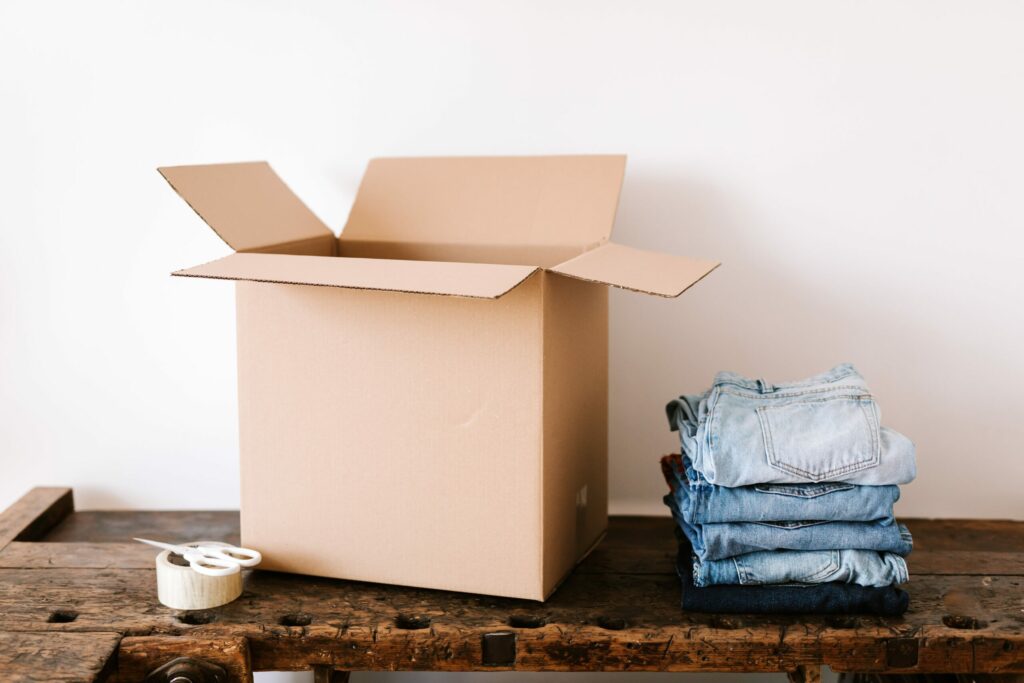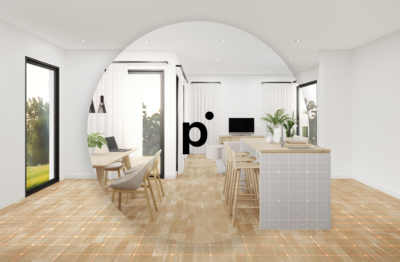Table of contents
ToggleThe first apartment is a major highlight for young adults, as it symbolizes an important step towards independence. But there are a few traps lurking here. To help you avoid this when looking for your first home, here are some important tips.
We explain how you can find a suitable apartment, how much your first rental apartment may cost and how you can finance it, what you need for your household, what you need to consider when moving out and how you can best organize the move.
How do I find my own apartment?
When looking for your first home, you should first take your time. Think about which districts or locations are suitable, find out about the desired area and infrastructure such as public transport. Proximity to school, university, the workplace, nightlife, shopping facilities and other important everyday locations is also a key consideration.
Once you have an area in mind, you should calculate a monthly budget. The rental apartment doesn’t have to max out this budget, but the framework will help you filter for suitable apartments. Now you can start an initial search online and get a good idea of what kind of apartment you can afford.
Create a list of attractive properties and contact the respective landlord or the responsible real estate agent. It is very important to be friendly and transparent right from the start. Answer questions quickly and explain your situation and your interest.
Ideally, you will now be invited to apartment viewing invited. Prepare yourself well by studying the floor plan, making a note of any questions you may have and bringing a tenant’s self-disclosure with you. The landlord or estate agent will ask you more detailed questions during the viewing, which is why it is important to bring proof of income, among other things.
Please note: attractive offers attract many potential buyers, especially in metropolitan regions. So don’t be surprised if your dream apartment is also the dream of many other potential buyers. After the inspection, the most important thing here is to lose no time and react quickly. Ideally, you will already have prepared all the important documents and can send the rental application to the landlord or the responsible estate agent directly after the viewing.
Those who are convincing at the viewing and with their rental application now have very good chances. In the next step, you will receive a draft rental agreement. Study it thoroughly, especially with regard to the rent and termination conditions, and if possible have a lawyer look at the document to protect yourself from catches in the rental agreement. If everything is in order, you can sign and move in on the processed date.
Another important tip for renting an apartment : When the keys are handed over, the apartment is inspected and a corresponding handover protocol is drawn up. Take plenty of time for this and make sure that all defects are noted. This is because “rented as seen” applies – this also means that you do not have to repair existing defects when you move out.
How much can the first apartment cost?
Many young tenants are unsure about the price of their first apartment. As a rule of thumb, affordable housing should not cost more than a third of your monthly income. Calculate how much money you have available each month and whether this is enough to cover your rent and other expenses.
Use our rent calculator to calculate your maximum rent based on your gross monthly salary.
Tip: If possible, resist the temptation to stretch your budget. Just because you can afford a more expensive rental apartment doesn’t mean you automatically have to rent it. Instead, consider renting a cheaper apartment and using the savings as equity for a future house purchase or for wishes such as a trip around the world.
For students in particular, it makes sense to find affordable rental prices through models such as a shared flat. Subletting or the Group liability per solidary rent are an option for young tenants without much equity. In addition, the landlord will ask for a deposit or security in the form of a guarantee.
Financial support for the first apartment
At first glance, the cost of rent for young tenants is often overwhelming. But don’t be intimidated. Because there are many possibilities for financial support in Switzerland. Consider whether one of these subsidies is suitable for you:
- Cantonal scholarship
- Education loan
- Scholarship from a private foundation
- Promotion of secondary education or training and further education
- Cash injections for young families
Please note that the funding options vary from canton to canton. The best point of contact is the responsible cantonal scholarship office. You can also get advice on financing your first home from your university or place of work, as well as from tenants’ associations.
What do I need for the new apartment?
In addition to the rent and the deposit, there are also expenses for furnishing the first apartment. You have a lot of control here. Think about whether your budget is sufficient to buy long-lasting furniture or whether you want to buy a basic set for the time being. You can obtain some very high-quality items at a reduced price from classified ads, flea markets and second-hand sellers.
Furniture makes up the largest share of the furnishing costs for the first apartment. But you should also plan a budget for the washing machine, fridge, TV and furnishings such as crockery, bed linen and curtains. Several thousand francs are realistic, with no upper limit.
It is best to draw up a list of the items you list of the required objects . Relatives and friends often help out with second-hand furniture so that you don’t have to buy everything new. Go through the rooms in your head and think about which of these furnishings you need for your first apartment:
- Entrance area and hallway: doormat, coat rack or coat hook, shoe rack
- Living room: sofa, armchair, television furniture, television, radio or music system, ceiling lamp, cupboard, decoration
- Dining room: table, chairs, lamp
- Kitchen: fridge, microwave, kitchen appliances such as toaster, scales and kettle, waste garbage can, pots, pans, place settings and crockery, cups, glasses, cutting knives, cleaning products, dishwashing brushes, washing-up liquid, ceiling lamp
- Bedroom: bed with slatted frame and mattress, comforter, pillows, covers, bedside table, bedside lamp, closet with hangers, mirror, curtains, ceiling lamp
- Office: desk, desk chair, bookshelf, work lamp, printer, wastepaper basket
- Bathroom: towels, shower curtain, shower mat, laundry basket, toilet brush, first aid kit, waste garbage can and objects such as hairdryer
A distinction can always be made between standard equipment and upmarket equipment. Remember to buy additional cleaning and washing equipment, tools and accessories such as extension leads and shopping bags.
What do I have to consider when I move out?
Before they move into their first apartment, they have to move out of their parents’ house. You should also plan time and possibly a small budget for this. Think about when you will be packing your personal belongings and how many boxes you will need. As a general rule, you always need more space than planned, which is why you should reckon with around 35 moving boxes for a complete children’s room.
You will also need the boxes for future moves and relocations. If you have enough space, it makes sense to store them. Other tasks that need to be carried out when moving out include cleaning the old apartment or room, dismantling any existing furniture and repairing the apartment by painting and carrying out minor repairs.
Especially when you first move out, you can hope for a lot of support from friends and family. Offer delicious drinks or a pizza in return for your help, so that you can rely on lots of hard-working little helpers to help you undress and change. Also consider whether you know someone with a large car who can help you move.
How do I organize the move?
The move depends largely on how well you have planned. Leave enough time for packing and draw up a furniture layout plan early on. This will help you determine whether everything will fit into the new home and which moving boxes and furniture you should put away first.
As a young tenant, you can probably manage the move on your own. Let yourself be supported by loved ones. You also receive removal vans and help with dismantling and assembling furniture at fair prices.
Bear in mind that there are also some tasks to be done after moving in. So before you make yourself comfortable in your new home, you should register with the most important service providers in good time.
Residents’ registration office: Register with the relevant residents’ registration office or the citizens’ registration office at your new place of residence within 14 days of moving.
Service provider: In addition to private contacts, the service providers used should also be informed of the new address. A list helps you to keep track and inform insurers, banks and doctors about the move.
Last but not least, we advise you to ensure a good relationship with the landlord from the outset. This will make it easier to resolve any problems in the future. Can’t wait to start looking for your first flat? Then sign up here for the Properti search subscription with customised preferences!
All data are without guarantee. The information on this website has been carefully researched. Nevertheless, no liability can be accepted for the accuracy of the information provided.












